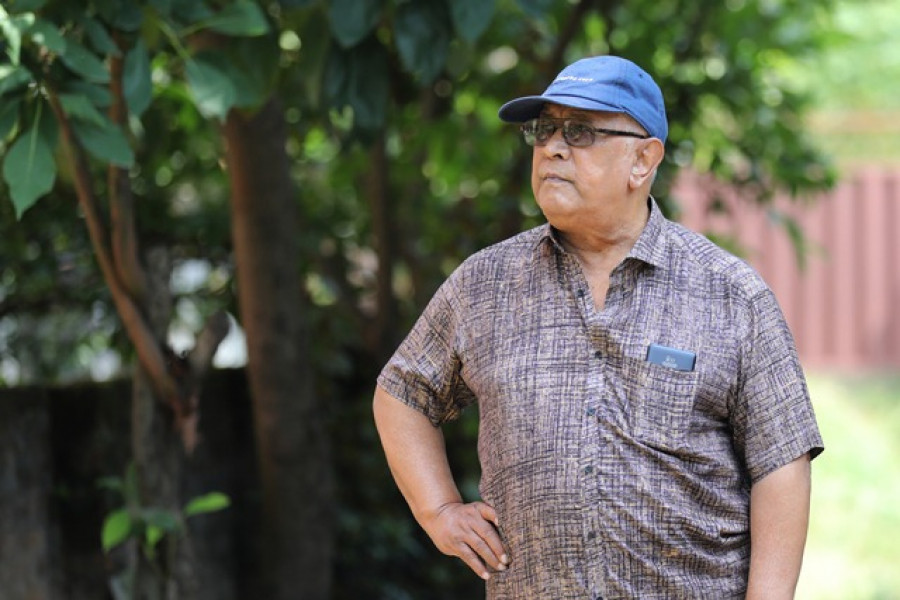Columns
In memory of a friend
Peter J Karthak as a musician and a writer had many worlds inside him.
Abhi Subedi
News of the sudden death of a friend, the well-known writer and musician Peter J Karthak, and reports of more people testing positive for coronavirus came simultaneously in the morning. And that was a double whammy! Peter had died from a cardiac arrest at dawn at one medical facility in Patan on 22 April 2020.
Peter lived with different circles around him. Musicians created his first circle. We writers, academics, expats and anarchists formed the second circle. And the English language Nepali media formed the last circle. I realised that for a long time I was acting as a bridge between the first and the second circles because I was close to musicians including his Guru Ambar Gurung and others, and wrote about them. Peter made the first comments.
Last year in June, I had written an article titled ‘Shanti Thatal’s Paleti serenade’ for this newspaper. It invited Peter's comment. His caveat was that the literary writers had created more words and thoughts than the musicians were prepared to accept them. That was a revelation to me. And that is precisely the point where one should enter to understand Peter J Karthak and appreciate his art of words and sounds.
Writing a friend's obituary is unstable karma. It does not work. This is perhaps one such attempt for 'writing zero', to use the French thinker Roland Barthes's expression. Still, I have made efforts to write briefly about Peter Karthak (1943-2020) in the following paragraphs, which is nothing but a collage of reminiscences and brief assessments of the content and historicity of his literary works. Mostly, his first circle, and the literary works are alluded to.
Peter's third circle—the media needs no mention here. Peter worked for The Himalayan Times, The Kathmandu Post, and The Republica and published regular columns and features about musicians and music. Thanks to Basanta Thapa's efforts, this was later published as a book entitled Nepali Music Makers (2018). In the book, Peter had added two long chapters about musicians excluded in his writings, at the suggestion of Basanta Thapa. Those chapters have given the book it's very apt subtitle: ‘Between the Dales of Darjeeling and the Vales of Kathmandu’. By using lexicons ‘dales’ and ‘vales’ that were used by the English Romantic poets, Peter, an MA in English literature from Tribhuvan University, has made no secret of his love for romantic imaginaire that has always remained the dominant element in Nepali songs and musical compositions. The lyrics of the late Agam Singh Giri of Darjeeling whom Peter describes in the book, was a very well known Romantic poet. Ambar Gurung's lyrics and his composition that shaped Peter's musical life are full of that Romanticism.
Peter and poet Ramesh Shrestha were a couple of years junior to me at the Central Department of English in Kirtipur. I was already teaching at Patan College when they graduated in English. I took both Ramesh and Peter to Patan college in 1971 where we created a team of young English teachers. Our literary friendship started from there. Recognising Peter's talent in fiction writing, I relentlessly asked him, ‘Why don't you write a novel in Nepali?’ Ramesh too supported this idea. Peter at first thought we were trying to take him to an unchartered territory. But he did start writing. Though a teetotaller, I regularly joined their jam sessions with a bottle of soda water during the manuscript readings.
By the time Peter finished the first draft of the novel Ramesh, Peter, SB Thakur and Nirmal Man Tuladhar, all graduates of English literature, must have drunk the best and the strong specimens of Newar wasa. Peter was a good connoisseur of Newar beverage being the son-in-law of the Prajapatis of Kilagal. Ranjana, his wife, as Peter confesses, gave him home in Nepal. Then the manuscript was taken to Shankar Lamichhane, the prominent essayist and critic for an introduction. After reading the manuscript Shankar Lamichane told Peter, ‘I read it. Now you revise it thoroughly and bring it back to me. I will read it again. If it did not work even then, we should burn this, and we all should smear its holy ashes on our foreheads’. Peter worked on the novel and it worked.
Shankar dai wrote his second and last introduction to a novel, the first being the long introduction to Parijat's novel Shirishko Phul (1965). Peter's novel titled Pratyek Thaun Pratyek Manche was published by Sajha in 1977. The next year Peter received the Sajha award for the best book. The English translation of this novel, Every Place: Every Person (2004), is also available. A collection of Peter's short stories also came out from Sajha in 1995.
In the year 1977 Ramesh, Peter and I put our English poems together and published a collection under the title Manas. We called our group RAP, formed after our initials. I wrote poems in English under the influence of the hippies. A philosopher, a freak and a sadhu-type person named Madhusudan Thakur from India was the member of our first circle. Now 89, Madhu lives in Delhi from where he sent me a very moving mail paying tribute to Peter. Peter always wanted people to call us the pioneering English language poets in Nepal though Ramesh and I were not too keen on that.
My last public meeting with Peter happened at a colloquium organised by the booksellers at a book exhibition in Kathmandu in June 2018. Peter and I were the speakers at the panel discussion moderated by Arun Gupto. That was a great literary confessional session that I reminisce today with great passion and respect. Peter explained his last novel Kathmandruids (2018) published by Book Hill as his attempt to put the inchoate flow of events in his life in Kathmandu. The same upon reviewing his novel I had written ‘The character through all Peter's mythic, mythological, modernist, postmodernist, surrealistic, revolutionary and empirical searches, if you like, dramatises the power of reaching nowhere’.
This last expression strongly reverberates in my mind sitting here today to pay tribute to the great friend and writer Peter Karthak!
***
What do you think?
Dear reader, we’d like to hear from you. We regularly publish letters to the editor on contemporary issues or direct responses to something the Post has recently published. Please send your letters to [email protected] with "Letter to the Editor" in the subject line. Please include your name, location, and a contact address so one of our editors can reach out to you.




 20.22°C Kathmandu
20.22°C Kathmandu















